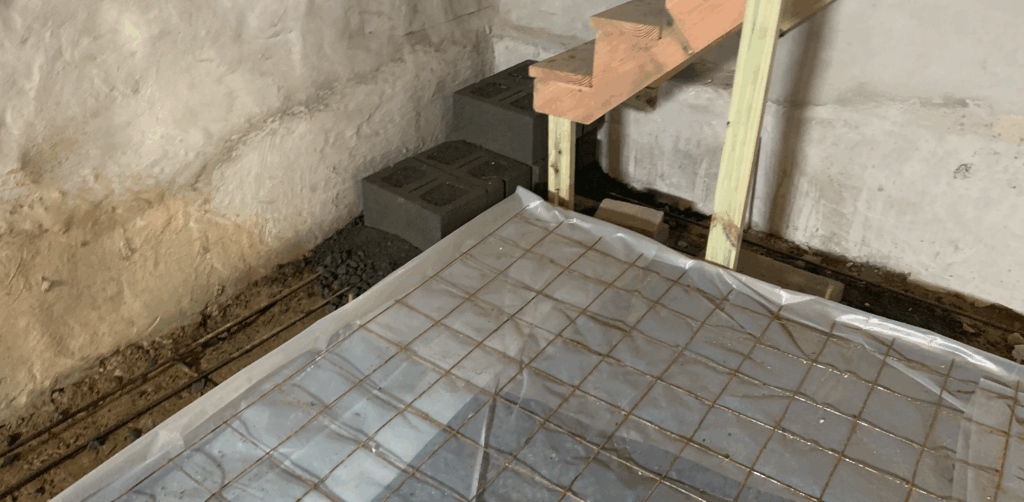Basement waterproofing keeps water and moisture out of your basement and helps ensure the long-term stability of your foundation.
But how exactly does it work?
Not all waterproofing solutions work for every NJ property. Understanding how waterproofing works and the different solutions available enables you to choose the right system for your property’s needs and local environmental conditions.
In New Jersey, where heavy rain, high groundwater, and clay-rich soils are common, hydrostatic pressure against basement walls and water intrusion can lead to mold growth, structural damage, and long-term foundation issues. These are just a few reasons why having a waterproofed basement is crucial.
This guide explains how the process works and provides practical steps to choose the right solution for your home.

By understanding how the waterproofing process works, you can find a contractor that provides the best long-term solution for your basement.
A professional waterproofing solution starts with a thorough assessment of your property and local environmental conditions to determine the source of moisture and any vulnerabilities.
Inspections include examining wall and floor surfaces, checking soil grading around the foundation, and measuring humidity or moisture patterns.
The inspector should determine whether water is entering from groundwater pressure, surface runoff, or structural cracks. Accurate diagnosis is the foundation of an effective solution.
A well-designed waterproofing system is custom-fit to meet the needs of and vulnerabilities of your basement. Some factors that your local contractor will need to consider include:
Proper waterproof system installation will preserve the longevity of your system and basement for decades to come.
Installation may involve interior drainage channels, sump pump systems, vapor barriers, or exterior waterproofing membranes, depending on the home’s needs.
Most waterproofing solutions can be completed with relatively minor disturbance to the home and surrounding soil.
A waterproofing system should be designed with long-term upkeep in mind. Service ports allow the drainage system to be inspected, and sump pump components should be easy to test or replace when needed.
Planning for pump backups, battery protection, and humidity control helps ensure that the system continues to work even during storms or power outages.
There is no single waterproofing method that works for every basement. The right solution depends on where the water is coming from, how your foundation was built, and the soil conditions around your home.
Before committing to any system, it is important to understand the underlying moisture pattern.
Contractors start by identifying how water appears during different weather conditions. Water that appears only during heavy rain suggests surface runoff or drainage issues.
Persistent dampness or white mineral staining usually indicates constant groundwater pressure. Cracks that widen seasonally may be caused by clay soil expansion, which is common in many parts of New Jersey.
In many cases, the best waterproofing approach combines:
A tailored system protects your basement over the long term, rather than a temporary fix.
Basement Conditions | Cause | Waterproofing Solution |
Wall dampness or white residue | Moisture wicking through concrete | Vapor barriers + interior drainage |
Water near floor edges | Hydrostatic pressure | French drain + sump pump |
Horizontal wall cracks or bowing | Soil expansion pressure | Structural reinforcement + exterior drainage |
Flooding during storms | Surface runoff | Exterior grading + downspout extensions + sump upgrades |
Basement waterproofing decisions should be evaluated through the lens of performance and lifespan, not just initial price. A lower-cost repair may stop water temporarily, but if it does not relieve water pressure or improve drainage, the problem often returns—sometimes worse than before.
Ask your local contractor how their waterproofing system plans to mitigate these issues and protect your basement.
Temporary fixes, such as sealing cracks or installing new downspouts, may help solve minor problems, but persistent moisture issues typically require a full-fledged basement waterproofing system–especially in wet areas like New Jersey.
A well-designed system with quality drainage components can last the lifetime of the home. Systems with lifetime, transferable warranties typically indicate stronger long-term reliability.
Yes. A dry basement improves indoor air quality, foundation stability, usable space, and buyer confidence. Buyers in New Jersey often look for homes with documented waterproofing.
If your home experiences frequent storms or outages, a battery or water-powered backup pump helps ensure the system keeps working when the primary pump loses power. This is often recommended in areas with high water tables.
No. Exterior waterproofing is typically used when water is entering from outside soil pressure or when foundation walls are showing structural stress. Many basements can be fully protected using interior drainage systems if the foundation is structurally sound.